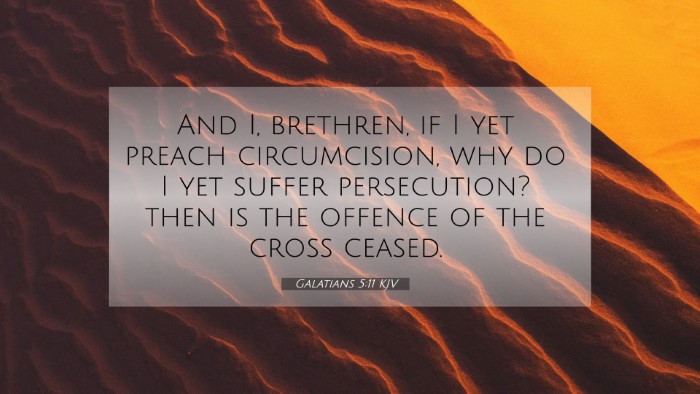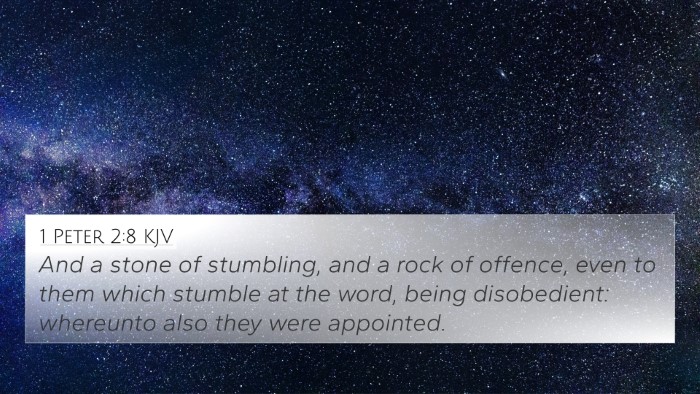Understanding Galatians 5:11
Galatians 5:11 states, "But if I, brethren, still preach circumcision, why do I still suffer persecution? Then the offense of the cross has ceased." This verse carries significant theological implications regarding the Apostle Paul's message to the Galatians, particularly concerning the theme of grace versus law and the centrality of the cross.
Contextual Overview
In the epistle to the Galatians, Paul addresses the issue of the Judaizers who were insisting that Gentile Christians must follow Jewish law, including the act of circumcision, to achieve salvation. Paul counteracts this persuasion by asserting the sufficiency of faith in Christ alone.
Key Insights from Commentaries
- Matthew Henry: This commentary notes that Paul's mockery of sermonizers who preach circumcision, even while facing persecution, extends to the absurdity of adhering to the law for salvation. He highlights that if good works and the law could save, then the sacrifice of Christ would be in vain.
- Albert Barnes: Barnes emphasizes that the offense of the cross is significant. It refers to the challenge of putting one's complete trust in Christ contrasted with the temptation of relying on the law. The offense arises from the idea that human merit is not sufficient for salvation.
- Adam Clarke: Clarke explains that Paul’s suffering for the gospel illustrates the true cost of following Christ. If he preached the law rather than grace, he would not face persecution because he would be aligning with the traditional Jewish view.
The Offense of the Cross
The "offense of the cross" signifies the contentious nature of the gospel message, which asserts that salvation cannot be attained through human efforts or adherence to the law. Rather, it revolved around faith and the redemptive work of Christ. This idea remains central in understanding Christian doctrine.
Cross-References for Galatians 5:11
- Romans 2:28-29 - Discusses true circumcision of the heart, establishing the inward transformation over outward observance.
- Galatians 6:12 - Paul refers to those who desire to make a good showing in the flesh by compelling circumcision.
- 1 Corinthians 1:18 - Highlights the message of the cross as foolishness to those who are perishing.
- Philippians 3:2-3 - Warns against evildoers and puts emphasis on placing confidence in Christ rather than in fleshly credentials.
- Acts 15:1 - Describes the early church's debate over the necessity of circumcision for salvation, which sets the context for Paul’s arguments in Galatians.
- Romans 5:1 - The justification by faith through Jesus Christ contrasts with the Jewish law as a means of righteousness.
- 2 Timothy 3:12 - Indicates that persecution is a part of living a godly life in Christ Jesus.
- Matthew 5:11-12 - Reinforces the blessings associated with persecution for Christ's sake.
- Galatians 2:21 - States that if righteousness comes through the law, then Christ died for nothing, reinforcing the message in Galatians 5:11.
- Colossians 2:14 - Talks about Christ canceling the record of debt that stood against us, demonstrating freedom from legalism.
Connecting Themes and Interpretations
This verse can be analyzed in light of various connections within the Bible. The struggle of grace versus law appears throughout the New Testament. Paul's discourse in Galatians represents a pivotal aspect of early church theology where believers were grappling with the Jewish law's requirements in light of Christ's sacrificial atonement.
Thematic Bible Verse Connections
Within the framework of inter-Biblical dialogue, understanding Galatians 5:11 involves connecting with verses that echo similar themes of faith, the law's insufficiency, and the centrality of Christ's sacrifice:
- Faith Alone: Romans 3:28 explains justification by faith without the deeds of the law.
- Law versus Grace: Ephesians 2:8-9 reinforces that salvation is by grace through faith, not by works.
- Suffering for the Gospel: 1 Peter 4:12-13 encourages believers to rejoice in sharing Christ's sufferings.
- The Cross as Central: John 14:6 - Jesus as the way, the truth, and the life speaks to the exclusive nature of the Gospel.
- Humility in Salvation: Luke 18:9-14 illustrates the Pharisee's arrogance compared to the humility of the tax collector.
Practical Applications and Reflection
For contemporary believers, Galatians 5:11 serves as a reminder of the importance of holding fast to the Gospel's core message of grace. It challenges the understanding that human efforts or rituals contribute to salvation. Instead, it calls for reliance on Christ and an acceptance of the potentially offensive message of the cross in a culture that often prioritizes human merit.
Tools for Bible Cross-Referencing
To fully explore these connections, using tools such as a Bible concordance or a cross-reference Bible study guide can aid in identifying the relationships between different scriptures. Engaging in a comparative study of Pauline epistles or utilizing a comprehensive Bible cross-reference system can deepen understanding of thematic links across the biblical texts.
Conclusion
In Galatians 5:11, Paul articulates a profound theological argument that continues to resonate with believers today. The verse encapsulates the heart of the Christian faith: the offense of the cross must not deter believers from the radical grace offered through Jesus Christ. By reflecting on the rich insights from biblical commentators and exploring cross-references, one can gain a fuller understanding of the interconnectedness of Scripture and the central tenets of the faith.


















